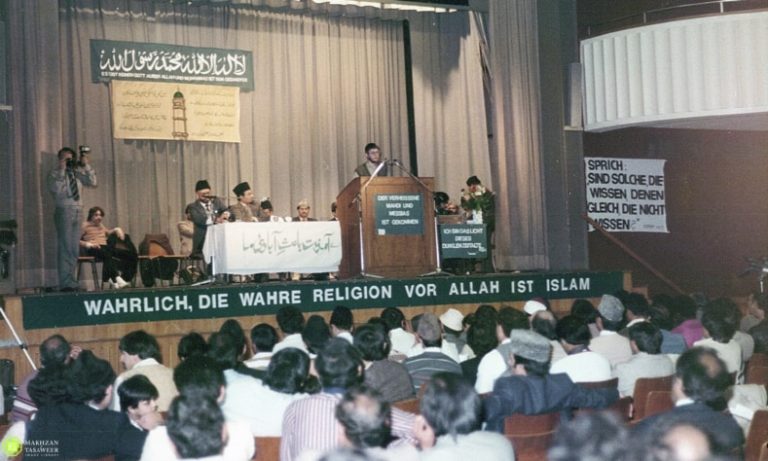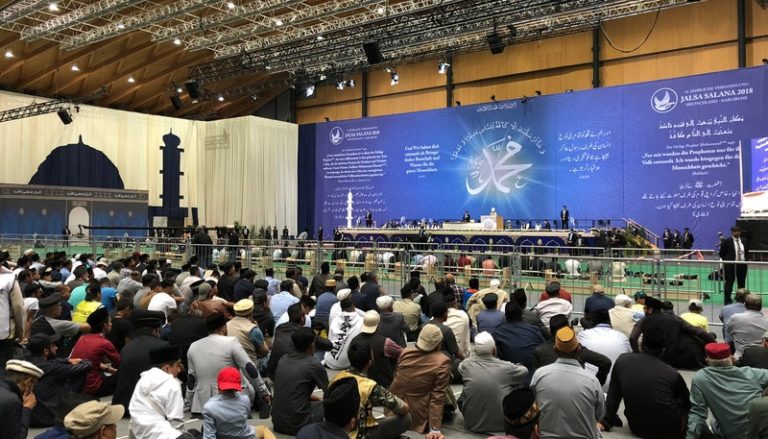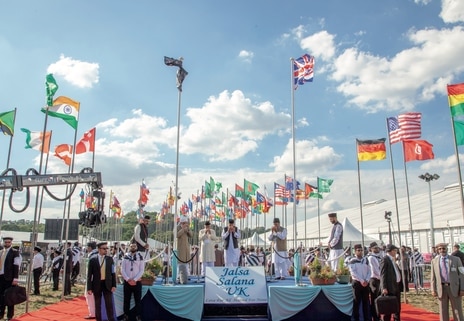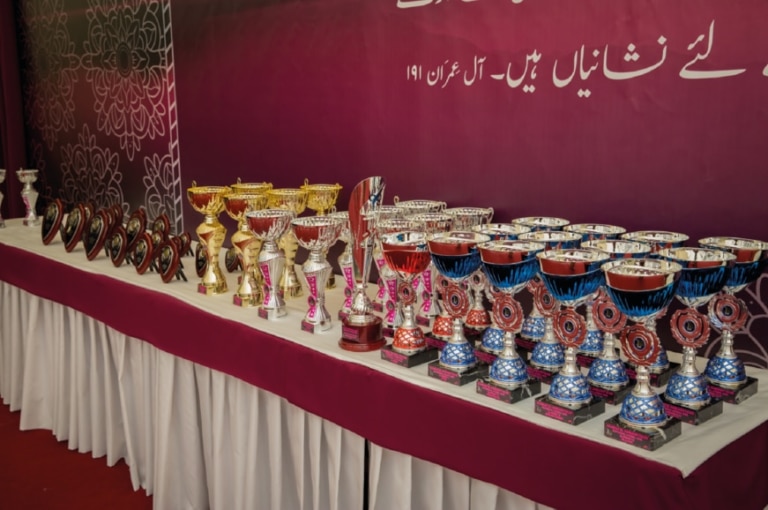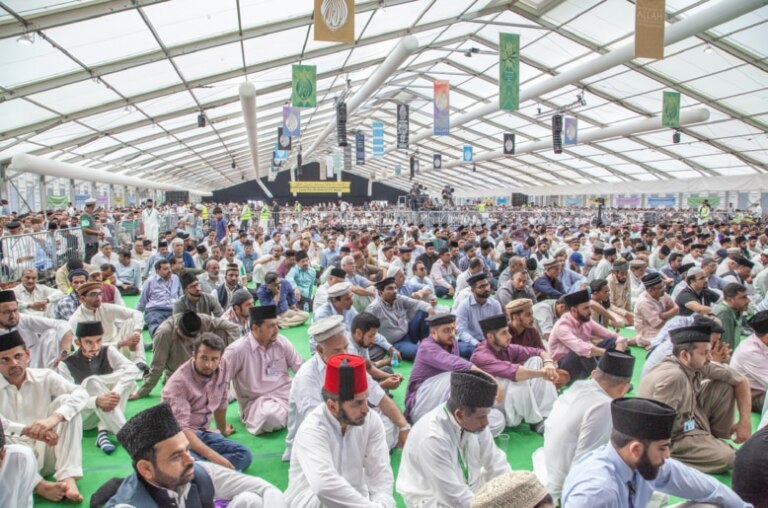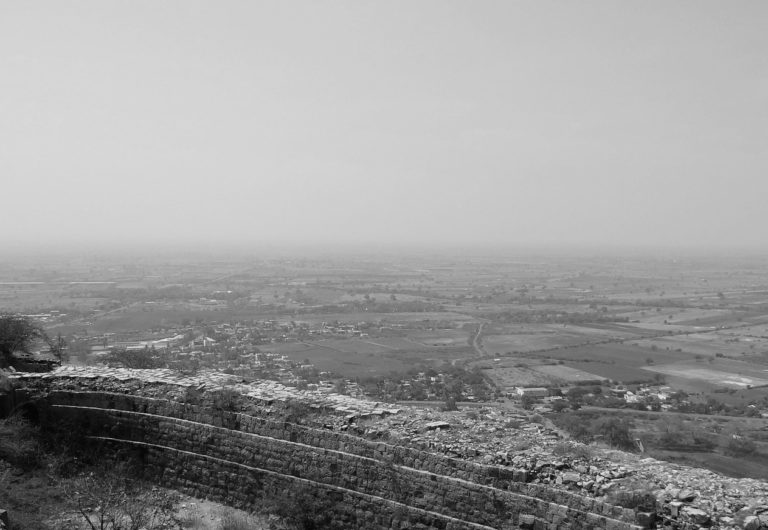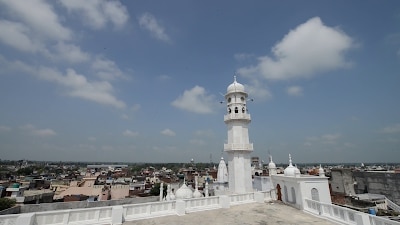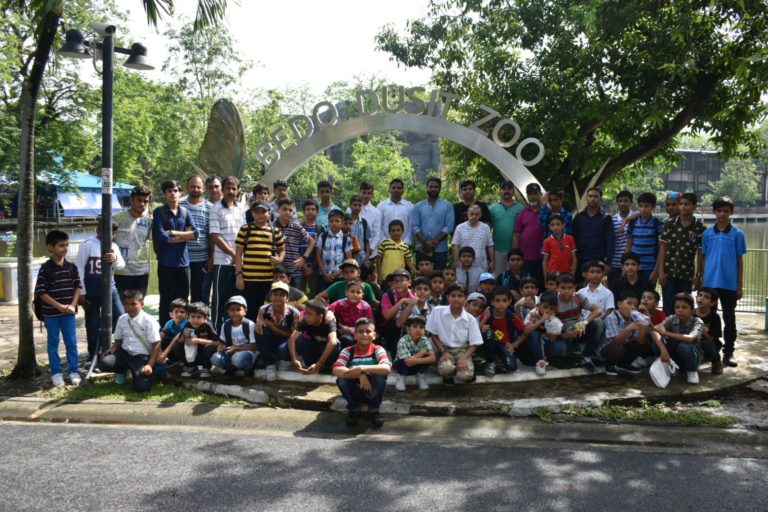Friday Sermon
3 August 2018
Jalsa Salana UK 2018
After reciting the Tashahud, Ta‘awuz, and Surah Al-Fatihah, Hazrat Khalifatul Masih Vaa stated:
Alhamdolillah, all praise belongs to God, by the Grace of God Almighty, we are able to participate in yet another Jalsa Salana [annual convention] today. Some people are taking part in the Jalsa for the first time. Many who have the means and the necessary documents to travel have been attending the Jalsa for numerous years. There are also some from the United Kingdom, who are attending the Jalsa for the first time as they have only recently settled here. There will also be some children, who will be benefiting from the atmosphere of the Jalsa for the first time since they matured.
Thus, everyone should try to benefit from the spiritual atmosphere of the Jalsa over the three days. They should listen to the proceedings of the Jalsa quietly and attentively. Only then will the participation in the Jalsa be beneficial. Only then will they be fulfilling the objective of holding the Jalsa, as set out by the Promised Messiahas.
As everyone is aware, the Jalsa arrangements, especially during the days of the Jalsa, are entirely, or at least up to ninety per cent, made by members of the Community on a voluntary basis. That is why some of the arrangements are prone to shortcomings or weaknesses. However, all of us participants must seek to remove those weaknesses and shortcomings. While the workers are constantly assessing their work and seeking to make improvements, the guest participants however should overlook those weaknesses and shortcomings, and wherever possible they should offer their help. We can only be united if we bear the burden of each other and help each other whenever required. Thus, this fundamental point should be remembered by both the guests as well as the hosts.
Usually I remind the workers and the hosts of their responsibilities and obligations in my sermon a week prior to the Jalsa and say a few words to the guests about their obligations during the sermon on the [first] day of the Jalsa. The beauty of our gatherings or rather the system of our Jamaat is when everyone fulfils their obligations in the most befitting manner and understands their importance. Moreover, it is by virtue of this that they will be able to live alongside each other with mutual harmony. In any case, today I will say a few words to both and draw their attention towards those matters.
I did not say anything to the workers in my last sermon. However, I reminded them as to how their attitudes should be and how they ought to work during my address at the inspection of the duties last Sunday. By the grace of Almighty Allah, one can say that the majority of the workers have been performing their duties since a long time. Thus, as far as understanding the nature of the work or performing it in the best manner is concerned, the workers here are quite well-trained. Moreover, the newly-joined workers, children and youth also benefit from the experience of the accomplished workers and officers. However, reminders need to be given about certain matters which require more attention. Thus, as I said, I will now draw the attention of both the guests as well as the hosts towards a few matters.
The first matter for the attention of the workers is that they have presented themselves to serve those people, who have come to participate in the Jalsa initiated by the Promised Messiahas, in fact it has been initiated upon the command of God Almighty. They have not come to attend any worldly fair, rather they have gathered to raise their standards of spirituality, knowledge and morality. I hope that this is the objective in the mind of every participant of Jalsa, and indeed it should be. Otherwise, their participation at Jalsa shall be of no benefit.
In any case, the workers should always remember that no matter what attitude the guests have, those who are serving must care for their feelings and sentiments while exhibiting the highest morals. Even if a guest or a participant were to adopt a wrong attitude, it is still the duty of the worker to keep their passions under control and not to reply with the same attitude. Having presented themselves for serving the guests for the sake of God Almighty, then, if it comes to it, workers will also have to tolerate the wrong attitudes of some of the guests for the sake of God Almighty. Only then can they become the recipients of the pleasure and happiness of God Almighty. What was the most excellent model of the Prophetsa we follow regarding guests? Those guests were not such who just came occasionally or once a year to Jalsa. Rather those people, who used to live in the same town, used to meet him daily. If he used to invite them to a meal due to their straitened circumstances or used to invite them otherwise and they started to talk for long and began to intrude in his rest or his work, he never stopped them. He never used to say to them that they should not come earlier than the agreed time for he was busy. He never used to say that they should depart immediately after having partaken from the food because he could not tend to some of his other duties due to them staying behind. When God Almighty saw the ways of the people and saw his forbearance, patience and morals, He said to the believers:
فَيَسْتَحْيِيْ مِنْكُمْ
“Being considerate of your sentiments, he shies away from stopping you but Allah is not shy of saying it. Thus, do not cause inconvenience to the Prophet by remaining at his home for a long period unnecessarily.” Thus, on the one hand, God Almighty has mentioned the most excellent model of the Holy Prophetsa regarding hospitality and mentioned his highest morals, and on the other hand, He especially commanded the guests not to go beyond the bounds of their rights while being guests. It is important to remain within limits and bounds. Guests should not wrongfully take advantage of their being guests.
Then there was a standard of hospitality with regards to non-Muslims. There was magnanimity of such a standard of forbearance that one is taken aback and astonished. We observe an example of this when a non-Muslim came as a guest. The Holy Prophetsa entertained him. When he got up and departed in the morning, he left his bed dirty. The Holy Prophetsa cleaned it himself and when his Companionsra asked him to let them serve and said, “We are here at your service. Why do you trouble yourself?” he replied, “He was my guest, hence, I will clean his mess.” (Masnavi, Maulvi Manvi, Daftar Punjum, pp. 20-24, Lahore, 2006)
Thus, this is that most excellent model which nobody can ever match. Our own members as well as others attend our Jalsa and they all possess good morals. They either come to gain knowledge of the faith or to gain information about Islam and Ahmadiyyat. As for human weaknesses, everyone has them. Even if someone were to make a small error and mistake, we cannot brand them as immoral or that they have ill intentions. These are all part of human weaknesses. Therefore, even if such minor issues arise, we should tolerate it. Regardless of whether an Ahmadi is a guest or a host, they should demonstrate high morals. However, those who have offered themselves for the service of the guests of Jalsa, they should demonstrate even higher morals. If the workers act with patience and kindness, the other person will naturally feel embarrassed [by their conduct]. Thus, those who are on duty should demonstrate the highest morals in every department and wherever they are offering duties. Furthermore, during these days, they should consider this to be a great challenge and as a result of this, they should demonstrate the highest morals. Turning our attention towards this, God Almighty states in the Holy Quran:
قُوْلُوْا لِلنَّاسِ حُسْنًا
i.e. to speak to men kindly and gently.
This is the fundamental aspect, which is essential in order to eliminate feuds and in order to demonstrate high morals. This principle is not merely to be adopted on special occasions, rather, it should be adopted permanently. Furthermore, once a person becomes accustomed to this, it eliminates the possibility of ever holding any grievances or committing injustices.
Thus, the hosts and guests should be mindful of this commandment of God Almighty on this occasion as well as for the rest of their lives. They should act in accordance to this particularly during these days. Everyone has to play a role in creating a pleasant atmosphere here so that we can fulfil the purpose for which we have gathered here; which is to improve our moral and spiritual state. Furthermore, these very morals will be the means of informing the non-Ahmadi guests in attendance of the high morals taught by Islam. This is a silent manner of tabligh [preaching the true message of Islam], which will be carried out by the guests as well as the workers.
The Holy Prophetsa stated that nothing weighs heavier on the scale than good morals. Furthermore, he also stated that the one who possesses good morals, acquires the status of one, who is regular in offering prayers and observing the fasts. (Sunan Abu Daud, Kitab-ul-Adab, Baab Fi Husn-e-Khulq, Hadith no. 4798-4799)
In other words, one is enabled to act virtuously. Moreover, when one is enabled to act virtuously, particularly for the sake of God Almighty, then one also becomes inclined towards worship. They are able to express their gratitude towards God Almighty because they are demonstrating good morals in accordance with the commandment of God Almighty. Furthermore, this very gratitude turns their attention towards worship. In other words, one virtuous deed enables one to perform many other virtuous deeds of the highest standard. One virtuous deed continues to produce many more virtuous deeds. Thus, the workers should make it incumbent upon themselves that whatever the conduct of the other person may be, they should always have a smile on their faces. This outwardly state also has an impact on their hearts and as a result, they will not develop any harshness in their hearts. Furthermore, when they will not develop any unnecessary harshness in their hearts, they will also not make any wrong decisions, which are at times made in a state where emotions run high and anger.
Mentioning the excellent status of this moral quality of the Holy Prophetsa, a companion states that he did not witness anyone smile and laugh more than the Holy Prophetsa. (Sunan Al-Tirmadhi, Abwaab-ul-Manaaqib, Hadith no. 3641)
Furthermore, the Holy Prophetsa also instructed his followers to show kindness as the person who has been deprived of kindness has also been deprived of doing good deeds. (Sahih Al-Muslim, Kitab-ul-Bir Wa Salat, Baab Fazl-ul-Rifq, Hadith no. 6598) Now, if the workers and those attending the Jalsa understand this, they will be able to garner the blessings and benefits of this atmosphere. By the grace of God Almighty, the workers serve every guest wholeheartedly. However, if, despite this, a person develops this feeling in their heart that such and such person is being afforded with better treatment than them, they, i.e. the workers, should seek to help remove such feelings and concerns. However, along with this, I would also like to say to the attendees of the Jalsa Salana, as I have also mentioned before, that by the grace of God Almighty, these vast arrangements are all being made by volunteers. They have not been employed by us. Some of them work in high positions and offices [outside of the Community]. They are simply rendering their services for the guests of the Promised Messiahas with an ardent devotion. Similarly, there are the youths, who are studying in secondary schools and universities. Among them are boys as well as girls. There are also young children. All of them serve with a certain passion. Therefore, even if you observe any minor shortcomings and flaws, then ignore them and keep this purpose in mind that we have merely gathered here in order to listen to the teachings of God Almighty, His Messengersa and of His religion.
Furthermore, if we keep this purpose in mind, there will be no reason to be making such complaints. There is a formal and established system for the arrangements of Jalsa Salana. There are various departments that have been formed in order to create efficiency in the overall operation. If a guest notices shortcomings in a certain department, or if they believe that in their view they are not being looked after as they ought to be, or they are not being served according to their due rights, then they should write to the person in charge of the department instead of quarrelling with the workers. Even if the shortcoming is not removed or improved this year, the Jamaat will be mindful of it for the coming year. This is the beauty of the system of the Jamaat that whatever flaws and shortcomings are highlighted, efforts are then made to improve them for the future.
An important department that deals with hospitality is preparing and cooking the food. The Langar [the area which prepares and serves food] prepares certain kinds of food during the days of Jalsa. For the time being, wherever Jalsas are being held around the world, or at least wherever the majority comprises of members from the [Indian] subcontinent, the food that is prepared comprises of alu gosht [lamb and potato curry], dal [lentil soup] and roti [Indian flatbread]. However, other types of food are also prepared specifically for people of other origins, and by this, I mean those who are not Pakistani or Indian. Nevertheless, those preparing the food should also be mindful of the fact that even though we will feed them according to what we wish to cook, the food should be well-cooked, in particular the meat. I have come to know that the meat was undercooked yesterday. There were fewer guests yesterday and as such, there may not have been many complaints. However, if this is the same case today, then the administration should sincerely pay attention towards this. If the quality of the meat is not good, then the administration should immediately look into this and purchase meat of a good standard. I am hopeful that the guests will not complain in this regard, Insha-Allah [God willing]. However, if they complain, it will be a justified complaint. Nevertheless, they should not do so filled with anger. Rather, they should affectionately inform the administration of this shortcoming in order to remove it. In this manner food will also not go to waste and we are also instructed to protect our provisions.
Furthermore, those attending the Jalsa Salana should also be mindful of the fact that the Holy Prophetsa said that one of the good morals taught by Islam is that a believer refrains from idle and unnecessary speech. (Sunan Ibn Maja, Kitab-ul-Fitn, Hadith no. 3976) In this Jalsa, which the Promised Messiahas has declared to be solely for the sake of God, we should refrain from every kind of idle speech and time wasting. You should listen to the proceedings attentively. Even if those delivering the speech are not of your preferred choice, however the topics of the speeches are chosen so that they can be of benefit to everyone. Furthermore, there is always one aspect or another during the speech, which leaves an impact on someone’s heart. Therefore, you should listen to it attentively so that it can have an impact on you.
Do not leave the Jalsa Gah [main arena of the Jalsa Salana] unless there is an urgent need to do so. The attendance in all other programmes should be as much as it is right now so the children and youth are able to realise the importance of Jalsa Salana and they are able to connect with faith and strive in this way. In this day and age of increasing materialism, it is indeed a very significant and crucial task for the parents to make their children and youngsters understand the importance of faith and to form a connection with it. Every mother and every father should endeavour towards this. May God Almighty grant everyone the ability to do so.
In terms of the upbringing of children and connecting them with faith, the most important aspect in relation to this is worship. In order to fulfil this task, the five daily prayers have been made obligatory upon us. We are combining prayers these days due to the Jalsa programmes and for everyone who has travelled from abroad. The prayers should be offered on time. You should be mindful of the prayer times and also bring your children for prayer if you are in Hadiqatul Mahdi. If you are not in Hadiqatul Mahdi and have returned home during the Salat times for Fajr, Maghrib and Isha prayer, then one should go to the nearest Salat centre or mosque to offer prayers. If someone’s house is far away from their mosque or Salat centre, then there should be arrangements to offer prayer in congregation at home. Similarly, the workers who are available during Salat times should offer their prayers in congregation here [in the Jalsa Gah]. Those workers who are on duty should offer their prayers immediately after their duty is over. The management or the person in charge of the duty should be mindful of the prayer times when assigning duties. It should not happen that prayer time is missed by someone because of their duty. Shifts should be managed in a way that both shifts get the opportunity to offer some prayers on time. If our focus is not on offering prayers, then all our efforts are futile.
I would like to say a few more things relating to the management. Those people who drive here should cooperate with the administration and they should park their cars where and how they are instructed to do so. From time to time there are difficulties in this regard and some people show stubbornness. They even argue with the workers and this ruins the arrangement and sometimes can even lead to risky situations and cause distress and danger.
I directed the attention of volunteers towards this on Sunday, but those guests and attendees of Jalsa who offer their prayers in the Fazl Mosque should also keep in mind to park their cars in areas that do not obstruct the driveways of our neighbors and to not cause them any kind of difficulty. I mentioned on Sunday to the volunteers about our neighbours who complained that some of us park the cars in front of their homes in such a way that it blocks their driveways. And so, they are neither able to take their car out nor are they able to park it inside. Some of them who know the Jamaat, as they meet us every year or they receive presents on Eid from us or we meet them during the days of Jalsa, have gone to the extent to say, “Although you speak so highly about Khilafat and claim that you are guided by Khilafat, therefore either the Khalifa does not advise you about fulfilling the rights of your neighbors or then you do not obey him.” Such a comment by an outsider is a source of shame for everyone. In any case, this caused me a great deal of embarrassment and what they said is indeed correct. If we block our neighbours’ driveways, then it has to be either of the two scenarios just mentioned. Thus, everyone should pay particular attention towards this and be mindful of this. If needed, then inconvenience yourself but do not obstruct the driveway of our neighbours, thus causing them discomfort.
No other religion teaches fulfilling the rights of neighbours as much as Islam. Despite that, if we do not follow this teaching, then it is indeed a great source of shame for us and such people are committing sin. Particularly I would like to address those who travel from outside of London and who come from Europe, from Germany etc., those who drive here in their cars, they should be particularly mindful of this. Some of them do not pay attention to this and I have been informed that when the youngsters on duty direct their attention towards this, they speak to them in a very inappropriate manner. So firstly, they commit a crime of wrongful parking and are usurping the rights of our neighbours and secondly, because of their behavior, they are reducing the respect and reverence which the youngsters have for elders. When this happens, the youngsters will also respond in a similar fashion resulting in a quarrel. Therefore, why even allow for such a situation to arise. Hence, it is futile for people with such attitudes to incur the expenses of traveling for Jalsa. It would be better if they do not come here at all. They are not only adversely affecting themselves by not fulfilling the commandments of God Almighty, but they are also damaging the upbringing of children as I have just mentioned. Therefore, particular attention should be paid towards this in future.
In terms of management there is a department of hygiene and cleanliness. Particular attention needs to be directed towards this as well. I have always reminded about this. We should always remember that hygiene and cleanliness is part of faith. Guests should clean up and dry the bathrooms and toilets after using them. Some complaints are received that there is so much water spilt that the person using the washroom afterwards is unable to use it. This is also the duty of the volunteers but it should not be left for the volunteers to handle all by themselves, rather, you should help them in this regard. Similarly, if there are any cups, cans, paper bags or any rubbish on the road and the walkways or in the open field, then it should be picked up and put in the bins.
There is another very important aspect that needs to be addressed here. These days due to the lack of rain, the grass has become very dry resulting into a fire hazard. Even though it has been cut and efforts have been made to secure it, however despite these efforts there is a chance of an accident. Therefore, all preventive measures should be observed in this regard and those on duty and the guests should all be particularly mindful about this. Do not throw any inflammable items or anything with a spark on the ground.
Since this is the reality and it should be mentioned to ensure we can overcome weaknesses, therefore if anyone is a habitual smoker they should smoke outside the premises of Hadiqatul Mahdi. However, do not consider this as a permission from me to smoke or that I do not consider smoking as a bad habit. It is a bad habit and one should endeavor to quit smoking and to abstain from it. I have delivered sermons on this topic. The Promised Messiahas has not adjudged it as forbidden but he did not approve of it as well. In fact, he has expressed his dislike regarding it at certain times and has instructed to refrain from it. (Malfuzat, Vol. 5, p. 235)
Some youngsters add certain drugs in cigarettes whilst socialising with the wrong crowd. Such things are wrong and are forbidden and considered sinful.
Then from a security point of view, you must be vigilant of your surroundings. Whether you are in the Jalsa Gah or outside, anyone can cause mischief, so one must remain vigilant of this. If you see anything suspicious or anyone acting suspiciously then you must immediately inform the nearest people on duty. Women must also take great care in this regard that no woman enters covering her face or enters the Jalsa Gah with her face veil. Furthermore, the scanning at the gates must be carried out properly, check their faces and whilst entering the Jalsa Gah they should have their faces uncovered. If it takes longer during scanning due to the extra measures taken and the guests have to wait a while, then they should bear this, because of course precaution and security are far more important.
Sometimes women complain regarding the mothers who come with children that when the children are given something to play with or something to eat and they are playing quietly, the mothers think that now that they are quiet, therefore they themselves can make noise and begin talking amongst themselves. At times, it is also the case that whilst the speeches are being delivered during the Jalsa they start to talk to one another and disturb others, and those mothers who wish to listen carefully [to the proceedings] are unable to do so. Therefore, the Lajna and those on duty there must bear this in mind. The noise made by children in the children’s marquee can be tolerated but the noise of the mothers will not be tolerated.
Similarly, there is also a complaint from the ladies that during the speeches in the main marquee, some women continue to talk amongst themselves and address those trying to keep them quiet in an incorrect manner by answering them inappropriately; this is not acceptable.
May God Almighty enable us to reap maximum benefit from the Jalsa and to follow the instructions which I have just given and which have been outlined in the programme booklets given to you. However, one thing you must keep in mind which is above and beyond all these instructions, which is incumbent upon us all and extremely important and that is to pray for the success of the Jalsa. Pray especially that out of God Almighty’s grace alone this Jalsa remains blessed in every respect and He protects us from all evil and that we all partake of the blessings for which we have gathered here today.
Likewise, I would also like to inform you that as always this year The Review of Religions have the Turin Shroud Exhibition in their marquee and there is also the Al-Qalam Project running adjacent to it.
Similarly the Archive Department [Ahmadiyya ARC] also have an exhibition which is worth visiting and a source of increasing one’s knowledge.
This time the Tabligh [outreach] Department have setup a Quran exhibition which I hope, Insha-Allah, will be very informative for everyone; that too should also be visited. Likewise, two websites will be launched – True Islam and Rational Religion. The Tabligh Department have also held an online speech competition on the topic of the life and character of the Holy Prophetsa in which people are taking part. So this too is a new feature for this Jalsa which they have introduced today.
As it were, these are extra programmes and exhibitions which are running on top of the programme in the Jalsa Gah in these days, so you should try to take benefit from them. May God Almighty make all the participants of the Jalsa recipients of the prayers of the Promised Messiahas.
(Translated by The Review of Religions)

